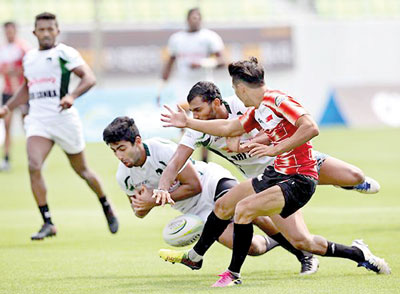We have what it takes, sharpen it with exposure
View(s): With seven players on the pitch and twice the pace of the traditional 15-a-side game, Rugby 7s combines force with stealthy agility. Sri Lanka has the agility and can be classed as a team that has a good reaction time. The frame may not there for force but, Sri Lanka does make up for that when and if they give quick ball and pass the ball around, and suddenly reacting to the break they see. Are we planning to be on par with the best in Asia and if so, the question of frame has to be addressed? That cannot come in a year or two but, may be in three years, if we permit people from outside to play and be eligible to play for Sri Lanka.
With seven players on the pitch and twice the pace of the traditional 15-a-side game, Rugby 7s combines force with stealthy agility. Sri Lanka has the agility and can be classed as a team that has a good reaction time. The frame may not there for force but, Sri Lanka does make up for that when and if they give quick ball and pass the ball around, and suddenly reacting to the break they see. Are we planning to be on par with the best in Asia and if so, the question of frame has to be addressed? That cannot come in a year or two but, may be in three years, if we permit people from outside to play and be eligible to play for Sri Lanka.
That means bringing in young players who can play for at least three years, before they can be included under eligibility rules. This will not happen unless and until the plan is sold and accepted by the clubs who are in the Council. What everybody seems to want is for the club to win, and if not, say “No” to foreigners on the basis of high cost. The reaction time and agility too, at times, went against the Tuskers, which gave away good ball, cost us much. That again is a result of the exposure being less, as sevens are few and far in between. Sevens in schools, sevens in clubs and may be a second sevens for the Mercantile sector, where only a championship is held.
Probably, more of the Super sevens, Carlton of Kandy sevens by whatever name you call it. It may be easier with Mercantile as the employer becomes first choice and players need to be released, and hence, the no release may not arise. The current performance places us in a position of being consistent in ranking but, the score in the Final in Korea requires putting on the thinking caps. Sri Lanka is a team which has a good reaction time and skills that make them exciting. Questions need to be asked as to whether our reaction at times was the best or have been reacting wrong. A couple of issues that deprived us of the No.1 position will be in place for analysis.
 For the Tuskers, to inch their way through to be No.1 is not an impossibility, considering the talent we have. The No.1 issue is that Tuskers require more exposure that would tie up the loose ends of discipline in the way the game is played. This is a young side that has potential and what is needed in addition to exposure is to build another pool of young sevens players who follow, to challenge those at the top. Sevens is a game that is exciting and as always, one mistake can give away possession which can cost a game. The Final of the 1st Leg was thrown away by giving away possession to Hong Kong (HK) via a misplaced kick-ahead which HK exploited.
For the Tuskers, to inch their way through to be No.1 is not an impossibility, considering the talent we have. The No.1 issue is that Tuskers require more exposure that would tie up the loose ends of discipline in the way the game is played. This is a young side that has potential and what is needed in addition to exposure is to build another pool of young sevens players who follow, to challenge those at the top. Sevens is a game that is exciting and as always, one mistake can give away possession which can cost a game. The Final of the 1st Leg was thrown away by giving away possession to Hong Kong (HK) via a misplaced kick-ahead which HK exploited.
This was when Sri Lanka was leading 7-0 . That was a one score advantage to the winners. In the Final of the 2nd Leg, it looked a jaded Sri Lankan side that went down 36-0. The hard fought match against Korea seemed to have taken its toll on the Sri Lankans which they won convincingly. Yet the bashing they took from the Koreans side had its effect on the Final. HK were leading 12 -0 when the hooter went for halftime. A decision was taken to play on in your five metres, with a penalty awarded and one man down with an injury. The pressure saw an uncomfortable kick collected by a man in front which looked terribly amateurish. The resulting penalty for offside allowed HK to score and take lemons with a comfortable 19-0 lead.
Going back to that somewhat unwise decision, as the players too were visibly tired and one man short with no quick replacement; it is difficult to understand why the Tuskers decided to take the penalty and attack from your five metres, when a kick to touch would have taken them to halftime. (The hooter had been sounded ). This is where, though we have a good reaction time and skills, the lack of match practice could trigger a wrong decision taken on the spur of the moment, while under pressure. These are not things a coach can drill, as this is what you do at this point but, needs to come to mind instantly.
That will come only if you have more and more sevens. Similarly, in the pool game against China, which Sri Lanka lost probably due to the decision to go in with three players, without an offload allowed. This allowed China to regain possession and make a scoring move, running from almost 70 metres out. The Sri Lankans have small frames and, in such a situation, going into contact with three should not have been the best reaction. Then again, Sri Lanka was within China’s five metres attacking, but a penalty was conceded for not releasing, which ended in China running 95 metres to score.
The match against Korea was somewhat bruising and Sri Lanka took a clear lead by the break. This was despite the knock-on at the kickoff, losing a line out defending five-metre and a turnover within three metres. Then again, when we were well ahead and at the hooter, a man taken in the air resulted in a penalty, with six Koreans against one Sri Lanka, giving Korea the only score. Overall, during the second legs, and the second against Korea, we were much better in cover defense as well as tackling, which prevented Korea from scoring when they had the opportunity. This is a young team with talent and they have shown what they can do.
To get to the next level requires not only a long term development plan but also, more sevens competitions at home, to develop a pool of sevens specialists. They also need more matches against other opposition. Ironically, it needs funds as well as commitment from all stakeholders. The next Leg will be here on October 15 and 16, giving Sri Lanka home advantage and the full force of local fan support. Hopefully, local Rugby fans will pack the venues on both days. Vimal Perera is a former Rugby Referee, coach and Accredited Referees Evaluator, IRB


